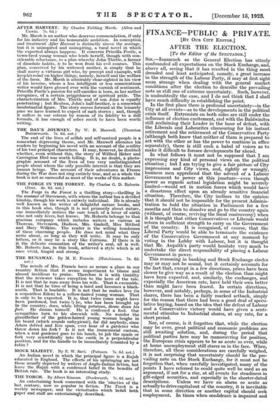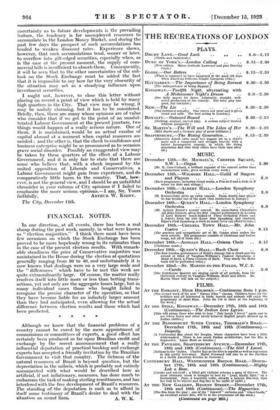FINANCE-PUBLIC & PRIVATE.
[BY OUR CITY EDITOR.]
AFTER THE ELECTION.
[To the Editor of the SPECTATOR.] SIR,—Inasmuch as the General Election has utterly confounded all expectations on the Stock Exchange, and, above all, seeing that it has resulted in the thing most dreaded and least anticipated, namely, a great increase in the strength of the Labour Party, it may at first sight seem strange when dealing with the general market conditions after the election to describe the prevailing note as still one of extreme uncertainty. Such, however, is undoubtedly the ease, and I do not think that I shall have much difficulty in establishing the point. In the first place there is profound uncertainty—in the City at all events—as to the developments in the political crisis itself. Extremists on both sides are still under the influence of election excitement, and with the Baldwinites still acclaiming their Leader in the hour of defeat, with the Liberals and Labourites clamouring for his instant retirement and the retirement of the Conservative Party (although both know that neither of them is prepared to act with the other or has the power to continue in office separately), there is still such a babel of voices as to make it difficult to foresee developments far ahead. In what follows it must not be supposed that I am expressing any kind of personal views on the political situation ; but I am trying to give a fair picture of City impressions and City views, and, rightly or wrongly, business men apprehend that the advent of a Labour Government to power at this juncture—even though power as regards actual legislation might be severely limited—would set in motion forces which would have a disastrous effect upon an already sensitive financial situation. Therefore, the City inclines to the opinion that it should not be impossible for the present Adminis- tration to hold the situation in Parliament for a few months and then to dissolve and go to the country again (without, of course, reviving the fiscal controversy) when it is thought that either Conservatives or Liberals would return in sufficient strength to carry on the Government of the country. It is recognised, of course, that the Liberal Party would be able to terminate the existence of the Conservative Government at any moment by voting in the Lobby with Labour, but it is thought that Mr. Asquith's party would hesitate very much to undertake the direct responsibility- of placing a Labour Government in power.
This reasoning in banking and Stock Exchange circles may or may not be sound, but it certainly accounts for the fact that, except in a few directions, prices have been slower to give way as a result of the election than might have been expected, and, similarly, the exchanges, and expecially the American rate, have held their own better than might have been feared. In certain directions, however, and notably, perhaps, in some of the Industrial shares, there has been a fairly marked setback, simply for the reason that there had been a good deal of specu- lative buying, based on the idea that the defeat of Labour and a Conservative victory would have given a senti- mental stimulus to Industrial shares, at any rate, for a short period.
Nor, of course, is it forgotten that, while the election may be over, great political and economic problems are still awaiting solution, and, during the period that political parties here may be manoeuvring for position, the European crisis appears to be as acute as ever, while at home unemployment still stares us in the face. When, therefore, all these considerations are carefully weighed, it is not surprising that uncertainty should be the pre- vailing note on the Stock Exchange, for it must not be forgotten that, when carefully investigated, many of the points I have referred to could quite well be used as an argument, if not for a rise, at all events for steadiness in gilt-edged securities, and especially in the shorter-dated descriptions. Unless we have an alarm so acute as actuallyto drive capitalout of the country, it is inevitable that in some direction or another capital should seek employment. In times when confidence is impaired and uncertainty as to future developments is the prevailing feature, the tendency is for unemployed resources to accumulate `in the London Money Market, and during the past few days the prospect of such accumulations has tended to weaken discount rates. Experience shows, howeirer, that such accumulations tend, sooner or later, to overflow into gilt-edged securities, especially when, as is the case at the present moment, the supply of com- mercial bills is insufficient to absorb them. Consequently, it will be seen that to the other uncertainties of the out- look on the Stock Exchange must be added the fact that it is impossible to say how far the very obscurity of the situation may act as a steadying influence upon investment securities.
I ought not, hoWever, to close this letter without placing on record a point of view which is held by many high quarters in the City. That view may be wrong, it may be unduly alarming, but it has to be considered. Briefly, then, there are many whose opinions are of value who consider that if we get to the point of an unadul- terated Labour Government at the present juncture, two things would happen of a really serious nature. One of them, it is maintained, would be an actual exodus of capital abroad at a moment when capital resources are needed ; and the other is, that the check to confidence and business enterprise might be so pronounced as to occasion grave social disorder. Possibly an exaggerated view may be taken by these quarters of the effect of a Labour Government, and it is only fair to state that there are some who believe that, with a check imposed by the united opposition of Liberals and Conservatives, a Labour Government might gain from experience, and do comparatively little harm to the country. That, how- ever, is not the general view, and I should be an unfaithful chronicler in your column of City opinions if I failed to emphasize the more serious opinions.—I am, Sir, Yours The City, December 12th.



















































 Previous page
Previous page